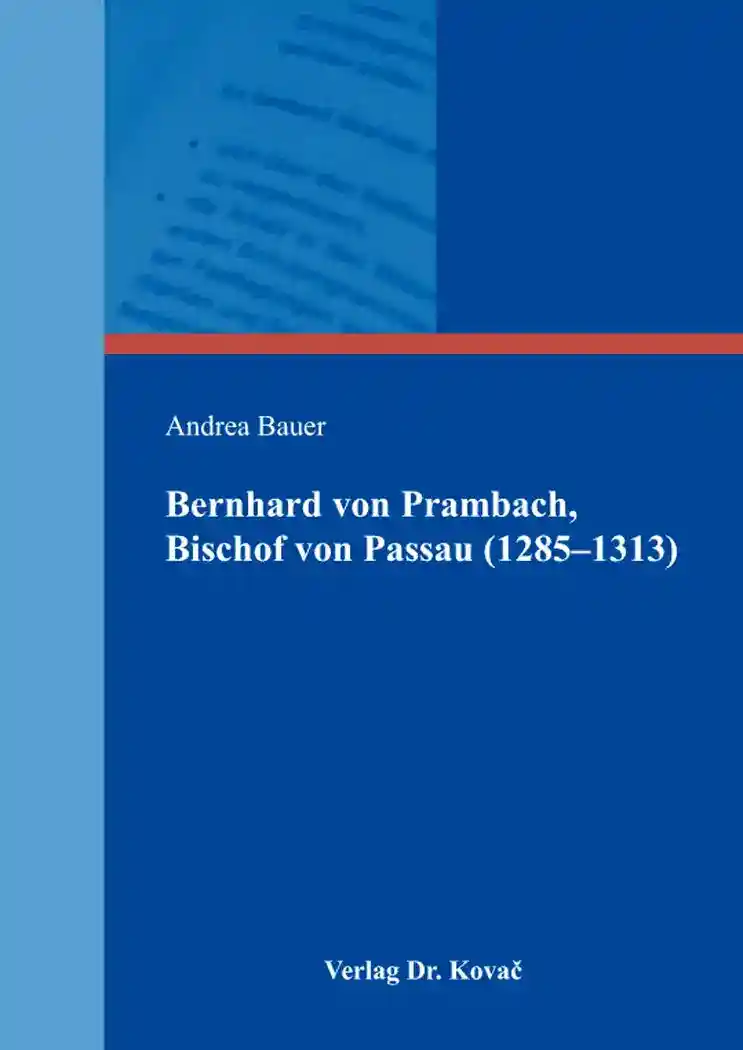Andrea BauerBernhard von Prambach, Bischof von Passau (1285–1313)
Studien zur Geschichtsforschung des Mittelalters, volume 36
Hamburg 2017, 304 pages
ISBN 978-3-8300-9492-0 (print) |ISBN 978-3-339-09492-6 (eBook)
Rezensionen
Bernhard von Prambach hat Bistum und Stadt Passau in ihrer Entwicklung entscheidend beeinflusst. Trotzdem wurde sein Wirken bislang nie durch eine Monographie gewürdigt. [...]
Die verdienstvolle Arbeit zur Passauer Bistumsgeschichte schließt mit über 40 Seiten Quellen- und Literaturverzeichnis, was die umfangreichen Arbeiten der Verfasserin zu der Regierungszeit Bischof Bernhards beweist.
[...] Die auf einer gesättigten Quellen- und Literaturbasis erstellte Arbeit erschließt [...] diesen Passauer Bischof, gibt wertvolle Einblicke in die Passauer Bistumsgeschichte an der Schwelle zum 14. Jahrhundert und leistet schließlich einen Beitrag für die Frage der Profilbildung der Fürstbischöfe im Spätmittelalter.
About this book deutschenglish
There is quite a large number of myths and puzzles that surround the history of the Catholic church in general. At many points, there is plenty of room for speculations or lively and controversial discussions. However, it is not required to exaggerate dramatically, as is done in the bestselling novel “Angels and Demons” by Dan Brown. It is not even necessary to move into the center of the Vatican in Rome. Since long before Pope Benedict XVI., born as Josef Ratzinger in Marktl am Inn, there have been clerical figures in local German regions who have left lasting impressions.
This study deals with one of them, Bernhard of Prambach, who carried out his duties as Bishop of Passau from 1285 to 1313. The author Andrea Bauer uses an inviting and lively diction, but following the principles of an academic publication which is constantly based on reliable sources. Thus, the exciting world of Bernhard of Prambach will be tangible and perceptible for the readers.
The mere fact that Prambach was elected Bishop of Passau surprised many contemporaries. He most definitely won the election due to one talent which he advanced and mastered during all of his tenure: diplomacy. For example, he cultivated good relations to several royal dynasties.
And also after the year 1285, the consecrated achieved quite some remarkable goals. As an example, this study verifies his renown as a mediator or how he consistently counteracted religious and social grievances. In 1298, which marked the year of the rebellion against the authorities of Passau, the bishop had to leave the town. A few months later – and after the situation had been cleared up by King Albrecht I. – he showed foresight. Prambach did not allow himself to be influenced by potential thoughts of vengeance. Instead, he granted those citizens extended rights who had engaged in the rebellion only shortly before. As a clerical in his best form, piousness played a crucial role for him.
The study is complemented by a bibliography with fundamental publications about the history of the town Passau, the Hochstift and the Bishop and also about the involved kings and dukes. For the first time ever, the work of the 42nd bishop of Passau is portrayed and it is done in a worthwhile fashion as well.
Keywords
Bernhardinischer StadtbriefBernhard von PrambachBischöfeBürgeraufstandEngelszellKirchengeschichteMittelalterMittelalterliche GeschichtePassauStadtbriefIhr Werk im Verlag Dr. Kovač

Möchten Sie Ihre wissenschaftliche Arbeit publizieren? Erfahren Sie mehr über unsere günstigen Konditionen und unseren Service für Autorinnen und Autoren.
